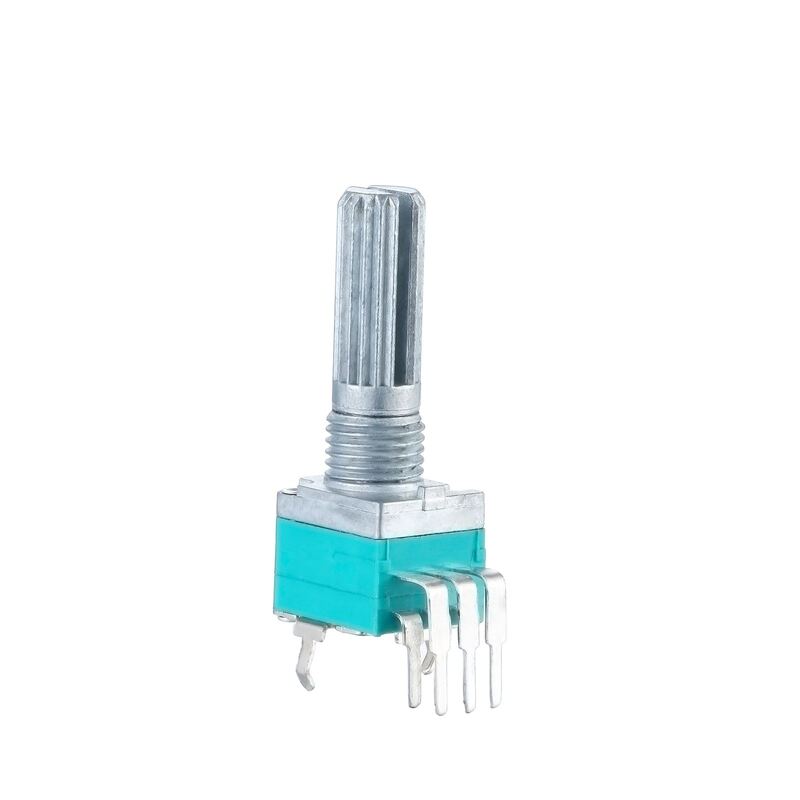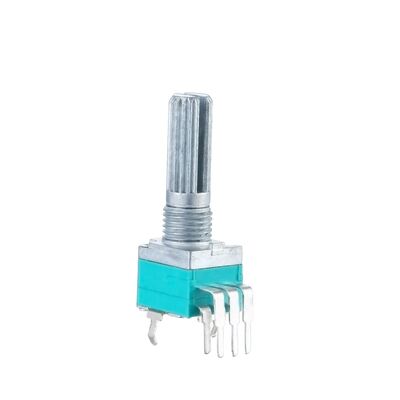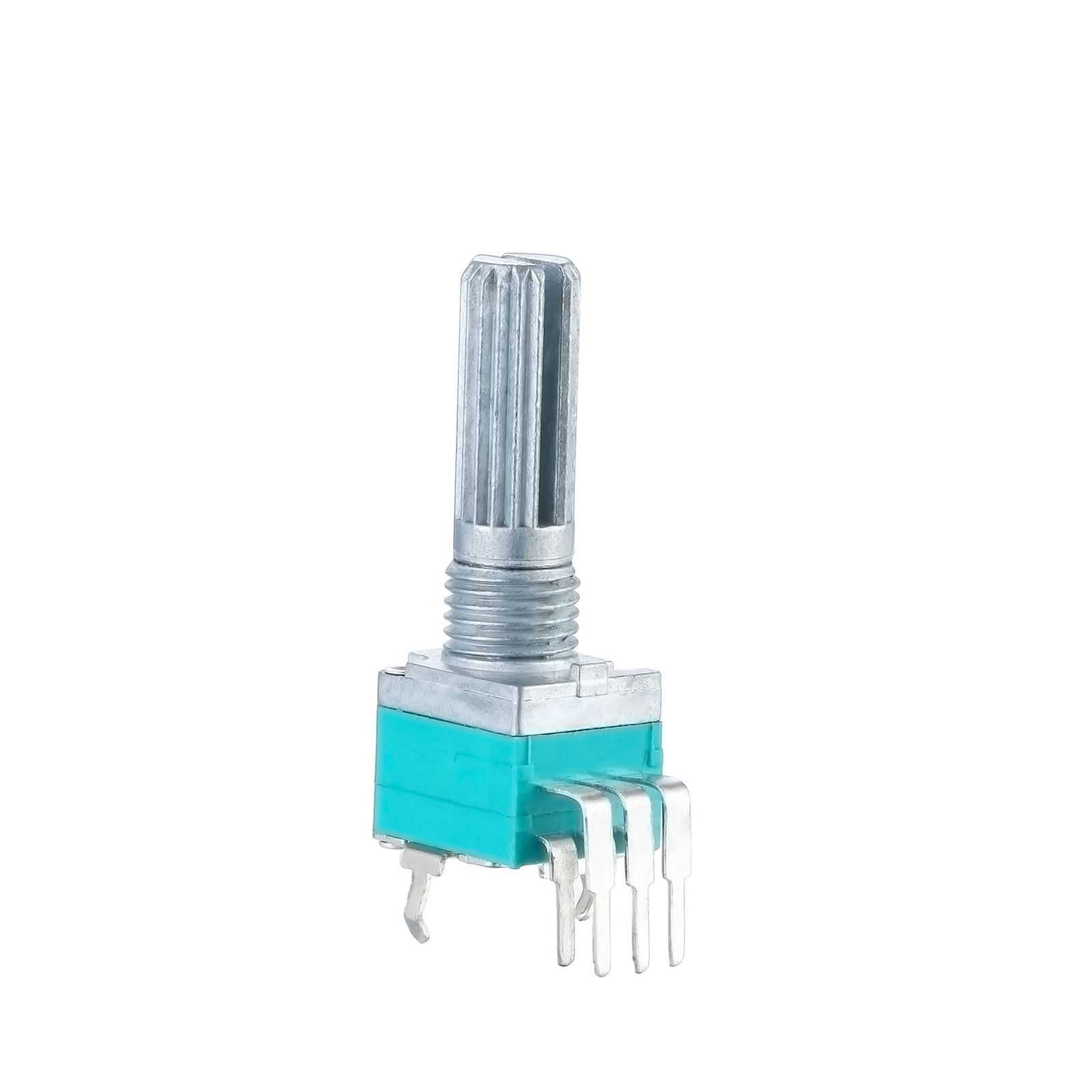Product Description:
The Rotary Potentiometer is a versatile and essential electronic component widely used in various applications to control voltage and adjust electrical signals with precision. Known for its reliability and durability, this device serves as an indispensable tool in circuits requiring adjustable resistance. Specifically designed as a Rotary Voltage Divider Potentiometer, it offers a smooth and accurate way to vary voltage levels in electronic circuits, making it ideal for tuning, calibration, and signal adjustment tasks.
This Rotary Potentiometer comes with a resistance range spanning from 300Ω to 3MΩ, providing a broad spectrum of options to suit different circuit requirements. Whether you need minimal resistance for fine adjustments or higher resistance for more significant voltage division, this product delivers consistent performance across the entire range. The flexibility in resistance values makes it an excellent choice for both low-power and high-power applications.
One of the key features of this Rotary Potentiometer is its shaft diameter, which measures 6mm. This size is optimized for easy handling and precise rotation, allowing users to make fine adjustments effortlessly. Moreover, the shaft diameter can be customized to meet specific needs, ensuring compatibility with various mechanical setups and user preferences. The shaft is crafted from high-quality plastic, which offers a lightweight yet durable construction. The plastic material ensures smooth rotation, reduces wear and tear, and provides a comfortable grip during operation.
Designed to withstand demanding electrical conditions, this Rotary Linear Variable Resistor boasts a dielectric strength of 500VAC. This high dielectric strength ensures that the potentiometer can operate safely in circuits with significant voltage without the risk of breakdown or damage. It also enhances the component’s overall reliability and longevity, making it suitable for industrial, automotive, and consumer electronics applications where performance under stress is critical.
As a Rotary Variable Resistor, this potentiometer offers linear resistance variation, which means the resistance changes proportionally with the rotation of the shaft. This linearity is crucial in applications where precise control of the output signal is necessary, such as audio equipment, instrumentation, and control panels. The smooth and consistent response of the potentiometer ensures that users can achieve exact voltage settings, improving the overall functionality and efficiency of their devices.
The construction quality of this Rotary Potentiometer is designed to meet rigorous standards. The internal resistive element is engineered to provide stable and repeatable resistance values throughout its lifespan. Additionally, the robust housing protects the internal components from dust, moisture, and mechanical damage, thereby extending the service life of the potentiometer. This makes it a reliable choice for long-term use in environments with varying conditions.
In summary, the Rotary Potentiometer is an excellent solution for anyone in need of a dependable Rotary Voltage Divider Potentiometer or Rotary Linear Variable Resistor with customizable options. Its wide resistance range from 300Ω to 3MΩ, combined with a 6mm or customized plastic shaft and a high dielectric strength of 500VAC, highlights its adaptability and robustness. Whether used in consumer electronics, industrial machinery, or precision instruments, this Rotary Variable Resistor offers exceptional performance, ease of use, and durability, making it a valuable addition to any electronic design or repair project.
Features:
-
Product Name: Rotary Potentiometer
-
Mounting Type: Through Hole/DIP Mount
-
Dimension: 9mm
-
Gang: Single
-
Shaft Material: Plastic
-
Terminal Type: PCB Lug
-
Function as a Rotary Manual Adjustment Tool for precise control
-
Operates as a Rotary Linear Variable Resistor to adjust voltage linearly
-
Serves as a Rotary Analog Adjustment Device suitable for various electronic applications
Technical Parameters:
|
Shaft Length
|
6mm-20mm Normal Or Customized
|
|
Power Rating
|
0.05W
|
|
Insulation Resistance
|
100MΩ Min
|
|
Operating Temperature
|
-25℃-85℃
|
|
Dielectric Strength
|
500VAC
|
|
Dimension
|
9mm
|
|
Shaft Material
|
Plastic
|
|
Rotational Life
|
10,000 Cycles
|
|
Shaft Type
|
Round/Flat/knurled
|
|
Resistance Tolerance
|
±20%
|
Applications:
The SANNI Rotary Potentiometer, originating from Dongguan, China, is an essential component widely used in various electronic and electrical applications. Known for its precision and durability, this product is ideal for occasions where accurate control of electrical position or resistance is necessary. The rotary multi-turn potentiometer design allows for fine adjustments over multiple rotations, making it perfect for scenarios that require precise tuning such as audio equipment, industrial machinery, and instrumentation panels.
This rotary electrical position sensor is widely utilized in automation systems where real-time feedback on the position of a mechanical component is crucial. Its ability to convert angular displacement into an electrical signal makes it indispensable in robotics, motor control systems, and automotive applications. The versatility of the SANNI potentiometer is enhanced by its shaft options, including round, flat, and knurled types, which cater to different mounting and operational needs. The plastic shaft material ensures lightweight and corrosion resistance, while the shaft length ranging from 6mm to 20mm can be customized to fit specific device requirements.
In addition to its role in position sensing, the rotary linear variable resistor function of the SANNI potentiometer is widely applied in user interface devices like volume controls, dimmer switches, and other adjustable controls. The product’s construction using a combination of plastic and metal materials guarantees both robustness and smooth operation. Its mounting options, through hole or DIP mount, provide flexibility in circuit board assembly, making it suitable for both prototype development and mass production.
Whether used in consumer electronics, automotive controls, or industrial equipment, the SANNI Rotary Potentiometer delivers reliable performance and adaptability. Its multi-turn capability, combined with customizable shaft types and lengths, makes it a preferred choice for engineers and designers seeking precise and durable rotary electrical position sensors or rotary linear variable resistors. The product's origin from Dongguan, China reflects SANNI’s commitment to quality manufacturing and innovation in electronic components.
Customization:
At SANNI, we offer comprehensive product customization services for our Rotary Potentiometer, a high-quality rotary adjustable resistor designed to meet diverse application needs. Originating from Dongguan, China, this rotary analog adjustment device operates reliably within a temperature range of -25℃ to 85℃, ensuring consistent performance in various environments.
Our Rotary Multi-Turn Potentiometer features a standard dimension of 9mm and a shaft diameter of 6mm, which can be customized according to your specific requirements. The shaft is made of durable plastic, providing smooth and precise adjustments.
Whether you need modifications in shaft size, material, or operational specifications, SANNI is committed to delivering tailor-made solutions that enhance the functionality and efficiency of your rotary adjustable resistor. Trust us to provide a rotary analog adjustment device that perfectly fits your application.
Support and Services:
Our Rotary Potentiometer product is designed for precision and durability in various applications. For technical support, please ensure that you have the product model number and specifications ready when seeking assistance. Troubleshooting tips include verifying the wiring connections, checking for mechanical obstructions, and confirming the potentiometer’s resistance range matches your application requirements.
We offer comprehensive services including calibration, repair, and replacement parts for the Rotary Potentiometer. Regular maintenance is recommended to ensure optimal performance, such as cleaning the contact surfaces and avoiding exposure to excessive moisture or dust.
For detailed product manuals, installation guides, and software updates, please refer to the official documentation provided with your product purchase. Our support team is committed to helping you achieve the best results with your Rotary Potentiometer.
Packing and Shipping:
Product Packaging:
The Rotary Potentiometer is carefully packaged to ensure it reaches you in perfect condition. Each unit is individually sealed in an anti-static bag to protect against moisture and static damage. The potentiometer is then placed in a sturdy cardboard box with foam inserts to prevent movement and absorb shocks during transit. For bulk orders, multiple units are securely packed in larger boxes with additional cushioning materials to maintain safety and integrity.
Shipping:
We offer reliable and fast shipping options worldwide. Orders are processed within 1-2 business days and shipped via trusted carriers with tracking information provided. We ensure that all packages are clearly labeled and handled with care to avoid any damage. Shipping times vary depending on the destination, typically ranging from 3 to 10 business days. Expedited shipping options are available upon request.
FAQ:
Q1: What is the brand name of this rotary potentiometer?
A1: The brand name of this rotary potentiometer is SANNI.
Q2: Where is the SANNI rotary potentiometer manufactured?
A2: The SANNI rotary potentiometer is made in Dongguan, China.
Q3: What are the typical applications of the SANNI rotary potentiometer?
A3: The SANNI rotary potentiometer is commonly used in electronic devices for adjusting voltage, volume control, and tuning circuits.
Q4: What is the resistance range available for the SANNI rotary potentiometer?
A4: The resistance range varies depending on the model, but SANNI offers rotary potentiometers in a wide range of resistance values to suit different needs.
Q5: How do I connect the SANNI rotary potentiometer in my circuit?
A5: The rotary potentiometer typically has three terminals: two for the ends of the resistive track and one for the wiper. By connecting the ends to your circuit voltage and ground, you can use the wiper terminal to adjust the voltage output.

 Uw bericht moet tussen de 20-3.000 tekens bevatten!
Uw bericht moet tussen de 20-3.000 tekens bevatten! Controleer uw e-mail!
Controleer uw e-mail!  Uw bericht moet tussen de 20-3.000 tekens bevatten!
Uw bericht moet tussen de 20-3.000 tekens bevatten! Controleer uw e-mail!
Controleer uw e-mail! 


